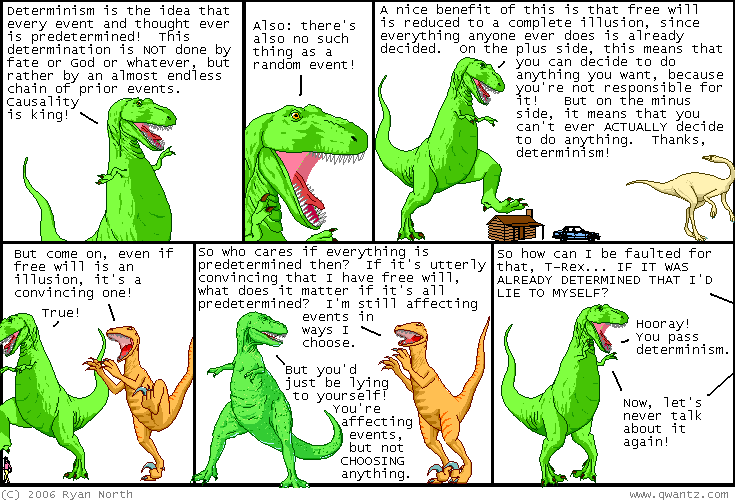I'm not talking about stuff like going to a psychic and trying to find out if your lottery numbers will ever actually hit the jackpot, but the large-scale idea of being able to scientifically predict the future(in theory).
It kind of boils down to this - how much of nature is *truly* random? Is there anything, that with enough data and the intelligence to analyze it, could not be predicted ahead of time? Seems to me that everything is kind of predetermined in a way, starting all the way back from the big bang. What we consider 'random', like random mutations and everything, would have to have some kind of explanation for them, right? I mean, what does the word 'random' even mean? Something truly random sounds to me like it'd be some sort of supernatural occurance.
Or what about fate(and in this case, I *do* mean on the human level)? I hear often that the fact that we can make personal choices means that nothing can be certain. But is it impossible to predict what somebody is going to think and thus the choices they make? I mean, the future WILL happen, right? I will decide on what to eat tonight, and there will be a reason for me choosing what I choose. This doesn't sound random to me at all. Can we actually make a random choice? I can do something that somebody will say is random, like making a clucking noise at a completely innappropriate time, but there will always be a reason for why I did that, whether it be to make people laugh, or to make people think I'm a 'random' person, or maybe I've just got a mental disorder that results in me doing things like this.
I'm certainly no expert on anything scientific or mathematical or anything like that, so I apologize if there's one simple little principle that I dont know about explains randomness, but for now, it just doesn't make sense to me. How can anything not have an explanation? I mean, if something is explained mathematically and there's a random in some equation, so you stick a 'random' number in there, where is that number coming from(apart from your mind, of course)? What in nature decides what numbers to put in?
It kind of boils down to this - how much of nature is *truly* random? Is there anything, that with enough data and the intelligence to analyze it, could not be predicted ahead of time? Seems to me that everything is kind of predetermined in a way, starting all the way back from the big bang. What we consider 'random', like random mutations and everything, would have to have some kind of explanation for them, right? I mean, what does the word 'random' even mean? Something truly random sounds to me like it'd be some sort of supernatural occurance.
Or what about fate(and in this case, I *do* mean on the human level)? I hear often that the fact that we can make personal choices means that nothing can be certain. But is it impossible to predict what somebody is going to think and thus the choices they make? I mean, the future WILL happen, right? I will decide on what to eat tonight, and there will be a reason for me choosing what I choose. This doesn't sound random to me at all. Can we actually make a random choice? I can do something that somebody will say is random, like making a clucking noise at a completely innappropriate time, but there will always be a reason for why I did that, whether it be to make people laugh, or to make people think I'm a 'random' person, or maybe I've just got a mental disorder that results in me doing things like this.
I'm certainly no expert on anything scientific or mathematical or anything like that, so I apologize if there's one simple little principle that I dont know about explains randomness, but for now, it just doesn't make sense to me. How can anything not have an explanation? I mean, if something is explained mathematically and there's a random in some equation, so you stick a 'random' number in there, where is that number coming from(apart from your mind, of course)? What in nature decides what numbers to put in?



